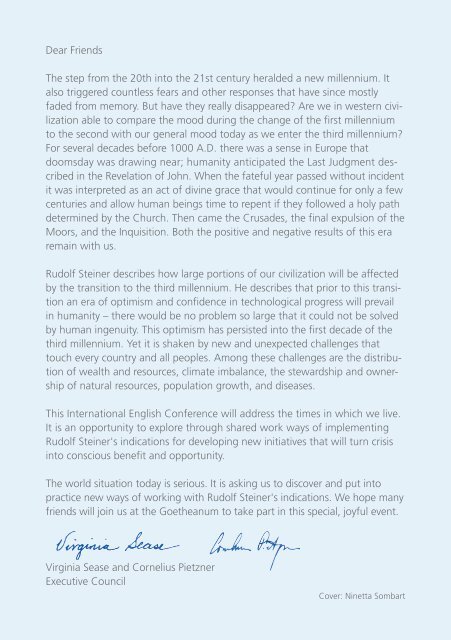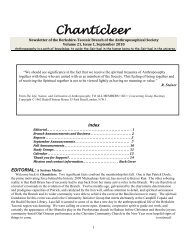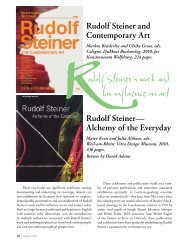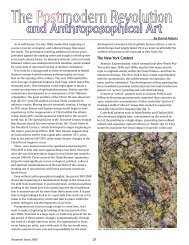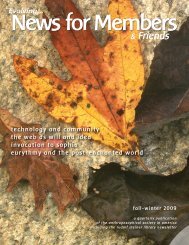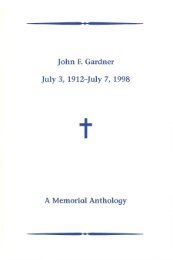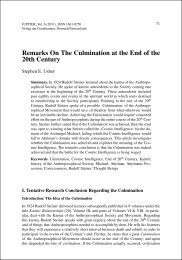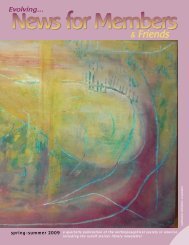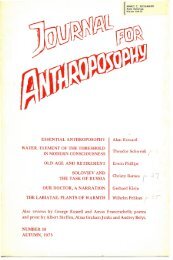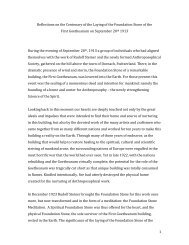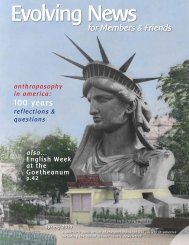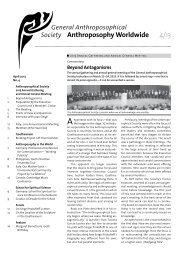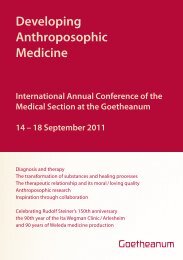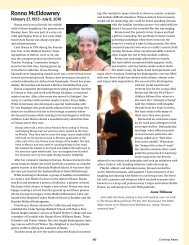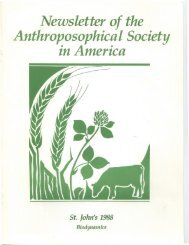Dear FriendsThe step from <strong>the</strong> 20th into <strong>the</strong> 21st century heralded a new millennium. Italso triggered countless fears and o<strong>the</strong>r responses th<strong>at</strong> have since mostlyfaded from memory. But have <strong>the</strong>y really disappeared? Are we in western civiliz<strong>at</strong>ionable to compare <strong>the</strong> mood during <strong>the</strong> change of <strong>the</strong> first millenniumto <strong>the</strong> second with our general mood today as we enter <strong>the</strong> third millennium?For several decades before 1000 A.D. <strong>the</strong>re was a sense in Europe th<strong>at</strong>doomsday was drawing near; humanity anticip<strong>at</strong>ed <strong>the</strong> Last Judgment describedin <strong>the</strong> Revel<strong>at</strong>ion of John. When <strong>the</strong> f<strong>at</strong>eful year passed without incidentit was interpreted as an act of divine grace th<strong>at</strong> would continue for only a fewcenturies and allow human beings time to repent if <strong>the</strong>y followed a holy p<strong>at</strong>hdetermined by <strong>the</strong> Church. Then came <strong>the</strong> Crusades, <strong>the</strong> final expulsion of <strong>the</strong>Moors, and <strong>the</strong> Inquisition. Both <strong>the</strong> positive and neg<strong>at</strong>ive results of this eraremain with us.Rudolf Steiner describes how large portions of our civiliz<strong>at</strong>ion will be affectedby <strong>the</strong> transition to <strong>the</strong> third millennium. He describes th<strong>at</strong> prior to this transitionan era of optimism and confidence in technological progress will prevailin humanity – <strong>the</strong>re would be no problem so large th<strong>at</strong> it could not be solvedby human ingenuity. This optimism has persisted into <strong>the</strong> first decade of <strong>the</strong>third millennium. Yet it is shaken by new and unexpected challenges th<strong>at</strong>touch every country and all peoples. Among <strong>the</strong>se challenges are <strong>the</strong> distributionof wealth and resources, clim<strong>at</strong>e imbalance, <strong>the</strong> stewardship and ownershipof n<strong>at</strong>ural resources, popul<strong>at</strong>ion growth, and diseases.This <strong>Intern<strong>at</strong>ional</strong> <strong>English</strong> Conference will address <strong>the</strong> times in which we live.It is an opportunity to explore through shared work ways of implementingRudolf Steiner's indic<strong>at</strong>ions for developing new initi<strong>at</strong>ives th<strong>at</strong> will turn crisisinto conscious benefit and opportunity.The world situ<strong>at</strong>ion today is serious. It is asking us to discover and put intopractice new ways of working with Rudolf Steiner's indic<strong>at</strong>ions. We hope manyfriends will join us <strong>at</strong> <strong>the</strong> Goe<strong>the</strong>anum to take part in this special, joyful event.Virginia Sease and Cornelius PietznerExecutive CouncilCover: Ninetta Sombart
Speakers/GroupleadersAlmon, Joan: Directs <strong>the</strong> U.S. Alliance for Childhood which supports a healthy, cre<strong>at</strong>ivechildhood for all children. Formerly, Joan was a Waldorf kindergarten teacher. She also servedas General Secretary of <strong>the</strong> <strong>Anthroposophical</strong> Society in America.Bana, Dilnawaz: M.A. degree Bombay University in Applied Psychology. Eurythmy DiplomaZuccoli School, Dornach. Cur<strong>at</strong>ive Eurythmy, Vienna. 22 years in Lukas Klinik. Active inIndia and neighbouring countries for anthroposophical work.Bana, Aban: College studies in Bombay and Vienna. Waldorf Educ<strong>at</strong>ion Diploma from Seminarin Goe<strong>the</strong>anum. Eurythmy Diploma from Lea van der Pal's school, Dornach. Activefor anthroposophical work in India and neighbouring countries.van Boeschoten, Marj<strong>at</strong>ta: Attended Waldorf school in England. Then worked as a lawyer.Presently management consultant working predomin<strong>at</strong>ely with large companies and governmentorganis<strong>at</strong>ions, <strong>the</strong> IAEA and <strong>the</strong> BBC. Board member Triodos Bank.Finser, Torin: Ph.D., Chair, Educ<strong>at</strong>ion Dept. Antioch University, New England. Led <strong>the</strong> WaldorfTeacher Educ<strong>at</strong>ion Program <strong>at</strong> <strong>the</strong> University for <strong>the</strong> past 20 years. A founder of <strong>the</strong>Center for Anthroposophy in Wilton, NH and currently serves as one of two GeneralSecretaries of <strong>the</strong> <strong>Anthroposophical</strong> Society in America.Gerster, Es<strong>the</strong>r: Painter, leads <strong>the</strong> guided tours <strong>at</strong> <strong>the</strong> Goe<strong>the</strong>anum. Teaches painting anddrawing <strong>at</strong> <strong>the</strong> <strong>Anthroposophical</strong> Studies course in <strong>English</strong>. Since 2006 General Secretaryof <strong>the</strong> <strong>Anthroposophical</strong> Society in Switzerland.Gilmer, Jane: Ph.D., trained in <strong>Anthroposophical</strong> Speech and Drama, Harkness Studio, Australia.Active in Rose The<strong>at</strong>re Company touring Europe with Shakespeare. Dept. Chair ofDrama <strong>at</strong> <strong>the</strong> N<strong>at</strong>ional Institute of Educ<strong>at</strong>ion in Singapore.Glöckler, Michaela: M.D. <strong>at</strong>tended Waldorf School. Studied German Language and MedicineTübingen/Marburg. Ten years paedi<strong>at</strong>rician Community Hospital Herdecke. Since1988 Leader of <strong>the</strong> Medical Section <strong>at</strong> <strong>the</strong> Goe<strong>the</strong>anum. Active as intern<strong>at</strong>ional lecturerand trainer of medical doctors.Hagens, Herbert: M.A., Princeton University. Lectures on Steiner's Mystery Dramas in <strong>the</strong>U.S. and <strong>at</strong> <strong>the</strong> Goe<strong>the</strong>anum. Has taught German language and liter<strong>at</strong>ure classes for morethan 30 years. Herbert and his wife live in Princeton, New Jersey, USA.Hipolito, Terry: Ph.D. in <strong>English</strong>, active member of <strong>the</strong> Section for <strong>the</strong> Literary Arts and Humanities.A major field of study is <strong>the</strong> Middle Ages.Hipolito, Jane: Ph.D., Professor Emerita of <strong>English</strong> and Compar<strong>at</strong>ive Lit. <strong>at</strong> Calif. St<strong>at</strong>e U., Fullertonand active member of <strong>the</strong> Literary Arts and Humanities Section.Janney, Fred: M.A., founding co-director in 1998 of <strong>Anthroposophical</strong> Prison Outreach. Retiredfrom Michigan Department of Corrections as a clinical psychologist in 2008 after 21 years.Koetzsch, Ronald: Professional standup comedian. A gradu<strong>at</strong>e of Princeton (B.A.) and Harvard(M.A. and Ph.D.), Ronald is Dean of Students <strong>at</strong> Rudolf Steiner College in Californiaand <strong>the</strong> editor of Renewal: A Journal for Waldorf Educ<strong>at</strong>ion.Kühl, Johannes: Studied physics in Hamburg and Göttingen (Max Planck Institute). Hetaught <strong>at</strong> <strong>the</strong> Waldorf School Stuttgart. Since 1996 leader of <strong>the</strong> Science Section <strong>at</strong> <strong>the</strong>Goe<strong>the</strong>anum.


